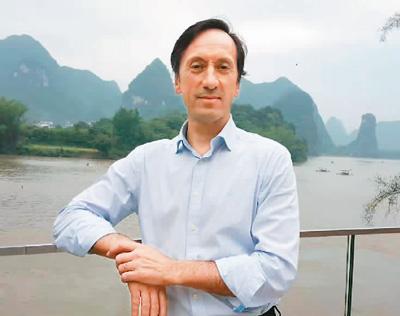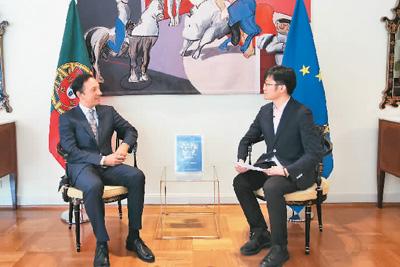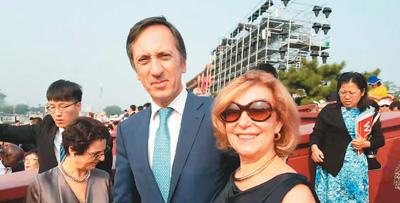


José Augusto Duarte (Photo via Embassy of Portugal in Beijing)
“I’ve always wanted to come to China, as Chinese culture is very attractive and fulfilling,” said Portuguese Ambassador to China José Augusto Duarte during an interview with People’s Daily.
Duarte served as Portuguese Ambassador to Mozambique and diplomatic adviser to the Portuguese President before he went to work in China. He rarely had any connection with China, but it didn’t reduce his yearn for the country.
In order to better understand China, the ambassador specifically went to the Confucius Institute in Lisbon to learn Chinese, and named himself “Du Aojie” in Chinese.
“I found here the ancient and strong Chinese civilization, the rapid development of Chinese society and the resilience and perseverance of the Chinese people,” he said, adding that the more he knows about it, the more he likes the Chinese culture.

José Augusto Duarte receives interview from People's Daily.
Apart from Chinese poetry, philosophy and music that have been inherited for thousands of years, the huge achievements made by China during the past 70 years also aroused huge personal interest.
He was impressed by advanced technologies in China immediately after he arrived in the country. “I underestimated the technology of Chinese products, but the dashing high speed trains and orderly high speed train stations did overturn my outdated knowledge of China,” he noted.
“The westerners are often subjective when they perceive China, so their reports and publications about the country also carry their own values, and sometimes even distort the facts,” the ambassador explained.
He believes that to understand China, one needs to visit and see it, then find points and communicate about them. “I always recommend my friends back home and from other countries to visit China,” he said.

José Augusto Duarte and his wife attend the the celebrations marking the 70th anniversary of the founding of the People's Republic of China (Photo via Embassy of Portugal in Beijing)
Proclaiming himself a fan of Chinese high-speed trains, Duarte speaks highly of the Chinese technology, saying that the high-speed trains are fast and comfortable, and are very competitive against other locomotives.
As early as the 16th century, the Portuguese started crossing the Eurasia continent and started sending Chinese silk, tea and porcelains back to Europe. Moreover, they also transported Chinese culture and art to the Iberian Peninsula which later had a profound impact on the culture of both Portugal and Europe.
So far, China has become Portugal’s largest trading partner in Asia. Their shared bilateral trade volume hit 5.2 billion euro last year, up 7.3 percent from a year ago. Furthermore, China invested over 9 billion euro in Portugal in various industries, such as energy, power, finance, insurance, and health care. Other than this, Portugal’s exports to China are also more and more diversified. Apart from automobiles and mineral products, farm produce, garments, and household supplies from Portugal are also popular among Chinese consumers.
“I hope that China and Portugal can further enhance their economic and trade relations, as it generates win-win outcomes,” Duarte said.
 Fire brigade in Shanghai holds group wedding
Fire brigade in Shanghai holds group wedding Tourists enjoy ice sculptures in Datan Town, north China
Tourists enjoy ice sculptures in Datan Town, north China Sunset scenery of Dayan Pagoda in Xi'an
Sunset scenery of Dayan Pagoda in Xi'an Tourists have fun at scenic spot in Nanlong Town, NW China
Tourists have fun at scenic spot in Nanlong Town, NW China Harbin attracts tourists by making best use of ice in winter
Harbin attracts tourists by making best use of ice in winter In pics: FIS Alpine Ski Women's World Cup Slalom
In pics: FIS Alpine Ski Women's World Cup Slalom Black-necked cranes rest at reservoir in Lhunzhub County, Lhasa
Black-necked cranes rest at reservoir in Lhunzhub County, Lhasa China's FAST telescope will be available to foreign scientists in April
China's FAST telescope will be available to foreign scientists in April "She power" plays indispensable role in poverty alleviation
"She power" plays indispensable role in poverty alleviation Top 10 world news events of People's Daily in 2020
Top 10 world news events of People's Daily in 2020 Top 10 China news events of People's Daily in 2020
Top 10 China news events of People's Daily in 2020 Top 10 media buzzwords of 2020
Top 10 media buzzwords of 2020 Year-ender:10 major tourism stories of 2020
Year-ender:10 major tourism stories of 2020 No interference in Venezuelan issues
No interference in Venezuelan issues
 Biz prepares for trade spat
Biz prepares for trade spat
 Broadcasting Continent
Broadcasting Continent Australia wins Chinese CEOs as US loses
Australia wins Chinese CEOs as US loses